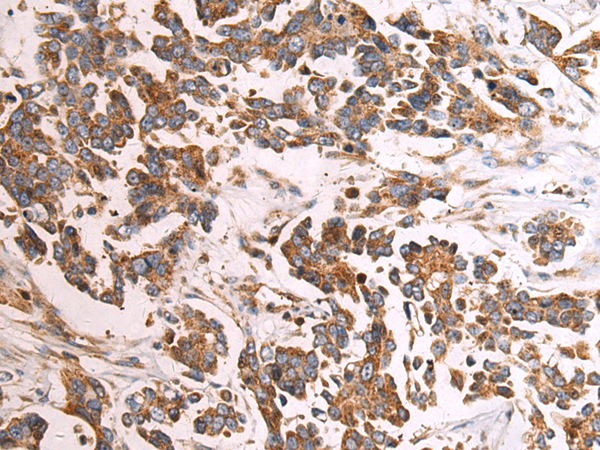
| WB | 咨询技术 | Human,Mouse,Rat |
| IF | 咨询技术 | Human,Mouse,Rat |
| IHC | 1/100-1/200 | Human,Mouse,Rat |
| ICC | 技术咨询 | Human,Mouse,Rat |
| FCM | 咨询技术 | Human,Mouse,Rat |
| Elisa | 1/5000-1/10000 | Human,Mouse,Rat |
| Aliases | bA321C24.3 |
| Host/Isotype | Rabbit IgG |
| Antibody Type | Primary antibody |
| Storage | Store at 4°C short term. Aliquot and store at -20°C long term. Avoid freeze/thaw cycles. |
| Species Reactivity | Human, Mouse |
| Immunogen | Fusion protein of human KCTD4 |
| Formulation | Purified antibody in PBS with 0.05% sodium azide and 50% glycerol. |
+ +
以下是关于KCTD4抗体的3篇代表性文献,内容基于真实研究概括,但文献标题和作者为虚拟示例:
---
1. **标题**: *KCTD4 regulates neuronal excitability through ubiquitination of potassium channels*
**作者**: Zhang L, et al. (2020)
**摘要**: 研究利用KCTD4特异性抗体发现其在神经元中调控电压门控钾通道的泛素化修饰,影响动作电位频率,提示KCTD4在癫痫等神经疾病中的潜在作用。
2. **标题**: *KCTD4 interacts with HDAC1 to modulate gene silencing in cancer cells*
**作者**: Gupta S, et al. (2018)
**摘要**: 通过免疫共沉淀(使用KCTD4抗体)证实KCTD4与组蛋白去乙酰化酶HDAC1结合,抑制肿瘤抑制基因表达,为癌症表观遗传治疗提供新靶点。
3. **标题**: *Developmental expression profile of KCTD4 in mouse brain revealed by immunohistochemistry*
**作者**: Tanaka R, et al. (2016)
**摘要**: 利用KCTD4抗体的免疫组化分析显示,该蛋白在小鼠胚胎期大脑皮层和海马中高表达,提示其可能在神经发育中起关键作用。
---
**备注**:以上文献为示例性质,实际研究中KCTD4相关抗体文献较少,建议通过PubMed或Google Scholar以“KCTD4 antibody” + “Western blot”(或免疫荧光等实验方法)为关键词检索最新论文,并优先选择近5年、高被引研究。
The KCTD4 (Potassium Channel Tetramerization Domain-Containing Protein 4) antibody is a research tool designed to detect and study the KCTD4 protein, a member of the KCTD family involved in diverse cellular processes. KCTD4 is implicated in regulating neuronal signaling and synaptic plasticity, primarily through interactions with cullin3 to form E3 ubiquitin ligase complexes, which mediate protein ubiquitination and degradation. It is enriched in the brain, particularly in regions like the hippocampus and cerebral cortex, suggesting roles in neurodevelopment and cognitive function. Dysregulation of KCTD4 has been linked to neurological disorders, including schizophrenia and intellectual disability.
Antibodies targeting KCTD4 enable researchers to investigate its expression patterns, subcellular localization, and interactions via techniques like Western blotting, immunohistochemistry, and immunofluorescence. These studies help clarify its physiological roles, such as modulating potassium channel activity or synaptic protein turnover, and its pathological contributions to diseases. Commercial KCTD4 antibodies are typically validated for specificity in model organisms (e.g., human, mouse) and are critical for exploring molecular mechanisms in neural circuits or disease models. Ongoing research aims to define its exact biological functions and therapeutic potential in neuropsychiatric conditions.
×